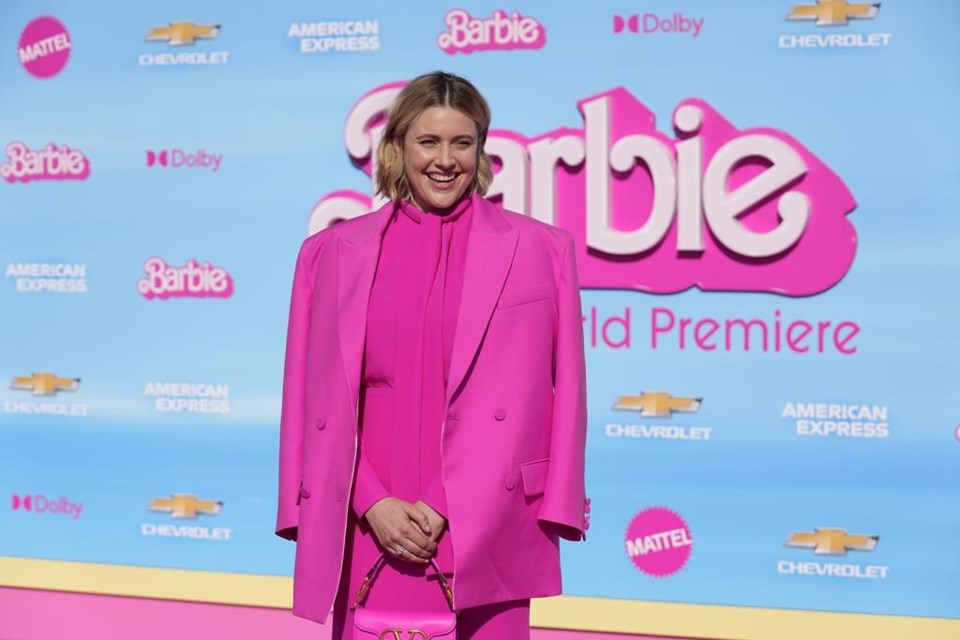Barbie, the doll, may be 64 years old, but “Barbie,” the movie, is a pandemic baby.
Greta Gerwig, the Oscar-nominated filmmaker behind “Little Women” and “Lady Bird,” started dreaming it up at a time when she wasn’t sure movies would ever come back.
“I wanted to channel something that had that ache in it, but also something so wild and unruly and something that was so just spilling out over the edges of it that you want to be in a group and see it big,” Gerwig told The Associated Press this week. “Because I thought we’ll never make any movies again, but if they’re going to, I’d like this.”
Her “Barbie,” which releases in theaters on Friday, is a joyful, maximalist, deeply weird, insightful and defiantly pink confection starring Margot Robbie and Ryan Gosling. She co-wrote it with her partner, Noah Baumbach, with whom she shares two sons — a toddler and a five-month-old whom they welcomed into the world while getting “Barbie” out to the world.
Gerwig spoke to the AP this week about the film, the reviews and the tension between art and commerce.
Remarks have been lightly edited for brevity and clarity.
AP: Reviews for “Barbie” came out (Wednesday) and are very positive. I’m wondering if you engage with those and how you’re feeling?
GERWIG: I do. I mean, of course. I’m not Emily Dickinson. I’m not above anything. I didn’t actually look last night because I just knew I would be too anxious. I was like go to sleep, wake up, caffeinate, get your kid to summer camp and then find out where we are. There’s a lot of reviewers that I really respect and have really liked. Film criticism matters to me as a person and also being in conversation with people who think about cinema matters. But it can feel very scary at the moment that you’re at the emotional pitch of releasing a movie to take it in.
What I tend to do is know which ones I’m going to go back to in a few weeks when I can take it in more. It’s too overwhelming at the moment. ... All my metaphors go to giving birth because I have a five-month-old but it would be like if you just give birth and then you’re like, “What are the reviews of the baby?” But I did check the email and I’m pleased. (“Barbie”) seems to have been received in the spirit that it was meant, which is exciting.
AP: I wondered going in if “Barbie” was going to be for kids, but then about 15 minutes in I realized that this is exactly the type of movie that I wish I’d had to obsess over at age 8 instead of, like “Grease 2.”
GERWIG: I’ve never thought of such a sharp delineation of like what’s for kids and for adults. I just don’t see it as church and state. There’s this Demetri Martin joke that’s like, saying you like kids is like saying, “I like people, for a little while.” We all have some sense of childhood and sense of moving out of it, too, which I think is something that I probably will be forever interested in. We’re not Merlin. We only live in one direction.
AP: There’s a scene where Barbie enters the real world and is being ogled on Venice Beach and certainly it’s something a lot of women can relate to, but I wonder if that reminded you at all of your days starting out as an actor and feeling like you had to look a certain way.
GERWIG: I always felt like I was just was never quite right, that I was somehow being looked at and found lacking. That’s not exclusively available for actors, I think it’s pretty universal. But it’s heightened as an actor. I did an audition once and I was wearing overalls, I think it was for a TV show, and I got into the room and the casting director looked at me and said “Well you must be very talented.” I thought, “Oh no, maybe I’m not talented enough to just be wearing overalls.” Also that this is going quite badly.
AP: There’s some thematic similarities between all your films — women’s economic independence, self-actualization and the idea that emotion is not a weakness.
GERWIG: With any project, I’m completely in it. I can’t really connect it to other things I’ve done. But then when I step back from it, I think, “Oh, these are connected in some way.” I think I’m just interested in the gleeful messiness of life and people. And I’m interested in women. I don’t know, I like them a lot. And I’m interested in women talking to each other through generations. The unwieldy nature of living life is not something that always has to be organized. It can kind of live in its own wildness.
AP: There was a Guardian piece, I’m not sure if you’ve read it, about indie directors “selling out.” I feel like this is related, that “Barbie” can be a Mattel movie and also a piece of legitimate art and expression as well. And also, like your characters, you’re ensuring your economic independence while getting your ideas out to the biggest audience possible.
GERWIG: I haven’t read it. I’m sure they make good points, probably. There’s always some tension, obviously, between art that exists in the world to be seen and consumed. I joked at the beginning that I’m not Emily Dickinson, but I really am not Emily Dickinson. I’m not writing poems on the back of envelopes and creating and destroying worlds from the confines of my home and never letting anybody see it. I’m making art to be seen by people.
Lindsey Bahr, The Associated Press




